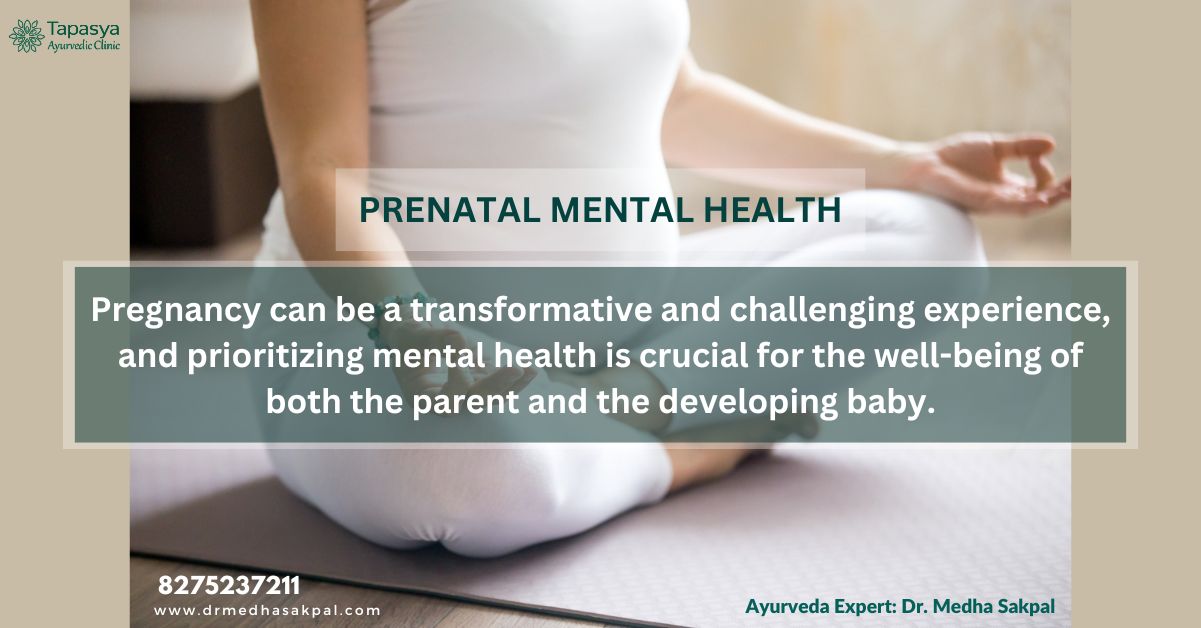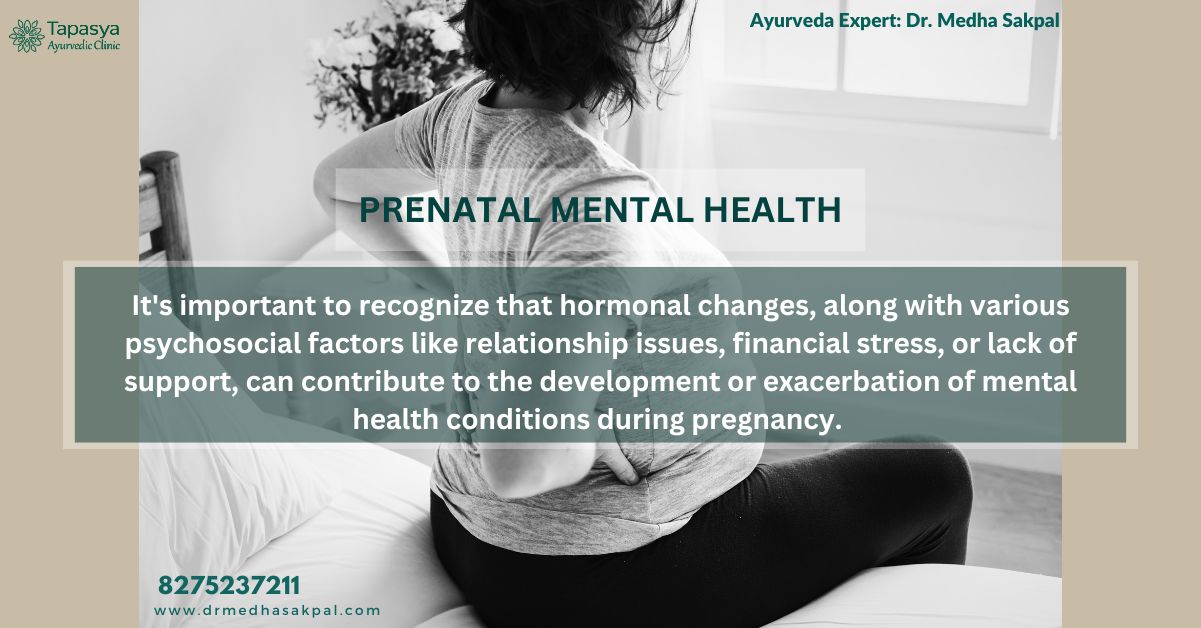Prenatal mental health refers to the emotional and psychological well-being of expectant parents during the period of pregnancy. It encompasses the various aspects of mental health, including emotional changes, the presence of mental health disorders, and the overall support and care needed during this critical time. During pregnancy, hormonal fluctuations, physical changes, and the anticipation of parenthood can impact the emotional state of expectant parents. It is common for individuals to experience a range of emotions, such as joy, excitement, anxiety, and mood swings. While some emotional changes are considered normal, others may indicate the presence of mental health conditions that require attention and support. Pregnancy can be a transformative and challenging experience, and prioritizing mental health is crucial for the well-being of both the parent and the developing baby.
Prenatal mental disorders, including prenatal depression and anxiety, can have a significant impact on the well-being of expectant parents. The prevalence of prenatal depression varies across studies, but it is estimated that around 10% to 20% of pregnant individuals experience depression during pregnancy. Some studies suggest that the rates of prenatal depression may be even higher in specific populations, such as individuals with a history of depression or certain socioeconomic factors. The prevalence of prenatal anxiety is estimated to be around 15% to 25% of pregnant individuals. Prenatal anxiety can have implications for the parent's overall well-being and may also influence pregnancy outcomes.
What Causes Prenatal Depression and Anxiety?
Prenatal depression and anxiety are mental health conditions that can occur during pregnancy. While the exact causes of these conditions are not fully understood, there are several factors that are believed to contribute to their development. It's important to note that every individual is unique, and the causes can vary from person to person. Here are some common factors that may contribute to prenatal depression and anxiety:
-
Hormonal changes: :
Pregnancy involves significant hormonal fluctuations, including increased levels of oestrogen and progesterone. These hormonal changes can affect neurotransmitters in the brain, such as serotonin, which is associated with mood regulation. -
Personal or family history: :
Women with a personal or family history of depression or anxiety are at a higher risk of experiencing prenatal depression or anxiety. Previous episodes of depression or anxiety, including those unrelated to pregnancy, can increase the likelihood of developing these conditions during pregnancy. -
Stressful life events: :
High levels of stress or exposure to stressful life events, such as financial difficulties, relationship problems, or a history of trauma, can increase the risk of prenatal depression and anxiety. Pregnancy itself can also be a source of stress due to physical discomfort, concerns about the baby's health, or lifestyle changes. -
Lack of social support: :
Inadequate social support during pregnancy can contribute to feelings of isolation and increase the risk of prenatal depression and anxiety. Lack of emotional support from partners, family, or friends, or experiencing significant life changes, such as moving to a new location, can impact a woman's mental well-being during pregnancy. -
Body image issues: :
Pregnancy can bring changes in body shape and weight, which can lead to body image concerns and self-esteem issues. Women who experience negative body image during pregnancy may be at a higher risk of developing depression or anxiety. -
Pregnancy complications: :
Certain medical conditions during pregnancy, such as gestational diabetes, preeclampsia, or difficulties with fertility or conception, can increase the risk of prenatal depression and anxiety. Coping with the stress and uncertainty associated with these complications can contribute to the development of these mental health conditions. -
Relationship changes: :
Pregnancy can bring significant changes to relationships, including shifts in roles, increased responsibilities, and changes in intimacy. Difficulties or conflicts within a romantic relationship or strained relationships with family members can contribute to prenatal depression and anxiety.
It's important to remember that prenatal depression and anxiety are medical conditions and not a reflection of a person's character or abilities as a parent. If you or someone you know is experiencing symptoms of depression or anxiety during pregnancy, it's crucial to seek help from a healthcare professional. Tapasya Ayurveda has experts who provide appropriate support, guidance, and treatment options to ensure the well-being of both the mother and the baby.
Nuclear Family and Prenatal Mental Health
The contribution of the nuclear family, which typically consists of a mother, father, and children, to prenatal depression and anxiety can vary depending on various factors. It's important to note that the nuclear family structure itself does not inherently cause or contribute to prenatal depression and anxiety. However, certain dynamics and circumstances within the family can influence a woman's mental health during pregnancy. Here are some ways in which the nuclear family may contribute:
-
Supportive family environment: :
A strong and supportive nuclear family environment can have a positive impact on a woman's mental well-being during pregnancy. When family members, particularly the partner, provide emotional support, understanding, and assistance with daily tasks, it can help alleviate stress and reduce the risk of prenatal depression and anxiety. -
Lack of support: :
On the other hand, if a woman lacks sufficient support from her nuclear family during pregnancy, it can contribute to feelings of isolation, stress, and overwhelm. Lack of emotional support, involvement, or understanding from the partner or other family members can increase the risk of prenatal depression and anxiety. -
Relationship difficulties::
Conflict, tension, or strained relationships within the nuclear family can exacerbate prenatal depression and anxiety. Difficulties in the relationship between the pregnant woman and her partner or conflicts with other family members can significantly impact her mental health. Unresolved issues, communication problems, or lack of support in the relationship can contribute to increased stress and emotional distress during pregnancy. -
Role adjustments: :
Pregnancy brings about changes in roles and responsibilities within the nuclear family. While some individuals may adjust well to these changes, others may struggle with the transition. Feelings of uncertainty, pressure, or role overload can increase the risk of prenatal depression and anxiety. -
Parenting concerns: :
Expectant parents may experience anxiety or worry about their ability to parent effectively. Concerns about being a good parent, managing the demands of parenthood, or adjusting to the new family dynamics can contribute to prenatal anxiety. These concerns may be amplified within the nuclear family structure. -
Communication and support systems: :
The level of open communication and availability of support systems within the nuclear family can impact a woman's mental health during pregnancy. If there is a lack of effective communication, difficulty expressing emotions or seeking help, or limited access to external support networks, it can contribute to feelings of distress and isolation.
It's important to recognize that the contribution of the nuclear family to prenatal depression and anxiety is not universal and can vary widely from one family to another. Supportive family dynamics, open communication, and understanding within the nuclear family can play a positive role in promoting maternal mental health during pregnancy. However, challenges within the family structure, such as lack of support, relationship difficulties, or role adjustments, can contribute to increased risk. In any case, seeking professional help from healthcare providers or mental health professionals can provide appropriate support and guidance for managing and addressing prenatal depression and anxiety.
Why Should Prenatal Depression and Anxiety be treated as early as possible?
It is observed that prenatal mental health is not considered important in the current situation. The patient visits the physician only when she faces any Physical health issues. It is very important to educate people about the effects and consequences of neglecting the mental health of expecting mothers. Treating prenatal depression and anxiety as early as possible is crucial for several reasons:
-
Maternal well-being: :
Prenatal depression and anxiety can significantly impact a woman's overall well-being during pregnancy. Untreated mental health conditions can lead to prolonged feelings of sadness, hopelessness, or excessive worry, making it difficult for the mother to enjoy her pregnancy and engage in self-care. Treating these conditions early can help improve the mother's emotional state and enhance her ability to cope with the challenges of pregnancy. -
Improved pregnancy outcomes: :
Maternal mental health has a direct impact on pregnancy outcomes. Untreated prenatal depression and anxiety have been associated with adverse effects such as preterm birth, low birth weight, and developmental problems in the baby. By addressing these conditions early, appropriate interventions can be implemented to minimize potential risks and promote a healthier pregnancy for both the mother and the baby. -
Bonding and attachment: :
Maternal mental health plays a crucial role in the mother-infant bond and attachment. Prenatal depression and anxiety can affect the mother's ability to form a strong emotional connection with her baby. Early treatment can help alleviate symptoms and enhance the mother's ability to bond with her child, promoting a positive and nurturing environment for the baby's emotional development. -
Postpartum mental health: :
Untreated prenatal depression and anxiety increase the risk of developing postpartum depression and anxiety. Addressing these conditions early on can help reduce the likelihood of experiencing postpartum mental health difficulties. Early intervention can offer the woman practical coping mechanisms and support networks that she can use in the postpartum period, easing the transition to motherhood. -
Quality of life: :
Prenatal depression and anxiety can significantly impact a woman's quality of life, affecting her relationships, work productivity, and overall functioning. By seeking early treatment, women can access appropriate support and interventions that can alleviate symptoms, enhance coping mechanisms, and improve their overall quality of life during pregnancy.
Individuals need to recognize the signs and symptoms of prenatal depression and anxiety and seek professional help if needed. Dr. Medha Sakpal at Tapasya Ayurveda provides appropriate diagnosis and treatment options, which includes therapy, support groups, lifestyle modifications, or, in some cases, medication. Remember, early intervention can make a significant difference in the well-being of both the mother and the baby
















